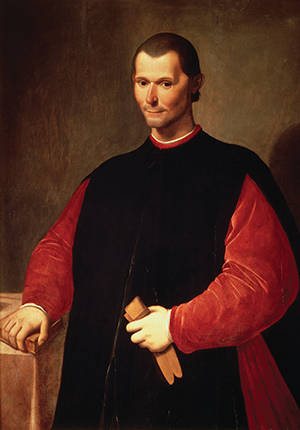Historic Document
The Prince (1513-15) and Discourses on the First Ten Books of Titus Livius (1513-17)
Niccolò Machiavelli | 1513-17

Museum of Palazzo Vecchio
Summary
Niccolò Machiavelli (1469-1527) was the author of The Prince (1513-15), Discourses on the First Ten Books of Titus Livius (1513-17), The Art of War (1520), Florentine Histories (1520-25), and other works. In America, Machiavelli was best known for the critique of morality and the ruthlessness so ostentatiously displayed in The Prince. His influence was nonetheless very great. For there were many—especially among the radical Whigs, in 17th and 18th century Britain and in revolutionary America—who found value in the argument, advanced in his Discourses on Livy, that discord, properly channeled, can give rise to good policy; that the people are the best guardians of liberty; and that republics need from time to time to return to their first principles. Machiavelli’s reputation as a teacher of evil was more of an obstacle to citing him by name than to drawing directly (or indirectly) on his thinking.
Selected by

Paul Rahe
Professor of History and Charles O. Lee and Louise K. Lee Chair in the Western Heritage at Hillsdale College

Jeffrey Rosen
President and CEO, National Constitution Center

Colleen A. Sheehan
Professor of Politics at the Arizona State University School of Civic and Economic Thought and Leadership
Document Excerpt
The Prince, Chapter 15:
“Of such things as render Men (especially Princes) worthy of Blame or Applause”—It remains now that we see in what manner a Prince ought to comport with his Subjects and Friends: and because many have writ of this Subject before, it may perhaps seem arrogant in me, especially considering that in my Discourse I shall deviate from the Opinion of other Men. But my Intention being to write for the Benefit and Advantage of him who understands, I thought it more convenient to respect the Essential verity, than the Imagination of the Thing (and many have fram’d imaginary Commonwealths and Governments to themselves which never were seen nor had any real existence) for the present manner of living is so different from the way that ought to be taken, that he who neglects what is done, to follow what ought to be done, will sooner learn how to ruin, than how to preserve himself; for a tender Man, and one that desires to be Honest in everything, must needs run a great Hazard among so many of a contrary Principle. Wherefore it is necessary for a Prince that is willing to subsist, to harden himself, and learn to be good or otherwise according to the Exigence of his Affairs. Laying aside therefore all imaginable Notions of a Prince, and discoursing of nothing but what is actually true, I say that all Men when they are spoken of, especially Princes (who are in a higher and more eminent station) are remarkable for some Quality or other that makes them either honorable or contemptible. Hence it is that some are counted liberal, others miserable (according to the Propriety of the Tuscan word Misero or Quaro in our language is one that desires to acquire by rapine, or any other way; Misero is he that abstains too much from making use of his own) some munificent, others rapacious, some cruel, others merciful; some faithless, others precise. One poor-spirited and effeminate, another fierce and ambitious; one courteous, another haughty; one modest, another libidinous; one sincere, another cunning; one rugged and morose, another accessible and easie; one grave, another giddy; one a Devout, another an Atheist. No man (I am sure) will deny but that it would be an admirable thing, and highly to be commended to have a Prince endued with all the good qualities abovesaid; but because it is impossible to have, much less to exercise them all, by reason of the frailty and crossness of our Nature, it is convenient that he be so well instructed as to know how to avoid the scandal of those Vices which may deprive him of his State, and be very cautious of the rest, tho’ their consequence be not so pernicious, but where they are unavoidable, he need trouble himself the less. Again, he is not to concern himself, if run under the infamy of those Vices without which his Dominion was not to be preserved; for if we consider things impartially, we shall find some things in appearance are virtuous, and yet if pursu’d would bring certain destruction; and others on the contrary that are seemingly bad, which if followed by a Prince, procure his peace and security.
Discourses on Livy:
Book 1
Chapter 3:
“What Events Caused the Creation of the Tribunes of the Plebs in Rome, Which Made the Republic More Perfect”—As all those have shown who have discussed civil institutions, and as every history is full of examples, it is necessary to whoever arranges to found a Republic and establish laws in it, to presuppose that all men are bad and that they will use their malignity of mind every time they have the opportunity; and if such malignity is hidden for a time, it proceeds from the unknown reason that would not be known because the experience of the contrary had not been seen, but time, which is said to be the father of every truth, will cause it to be discovered. . . . [M]en never act well except through necessity: but where choice abounds and where license may be used, everything is quickly filled with confusion and disorder. It is said therefore that Hunger and Poverty make men industrious, and Laws make them good. And where something by itself works well without law, the law is not necessary: but when that good custom is lacking, the law immediately becomes necessary. . . .
Chapter 4:
“That the Disunion of the Plebs and the Roman Senate Made that Republic Free and Powerful”—I do not want to miss discoursing on these tumults that occurred in Rome from the death of the Tarquins to the creation of the Tribunes; and afterwards I will discourse on some things contrary to the opinions of many who say that Rome was a tumultuous Republic and full of so much confusion, that if good fortune and military virtu had not supplied her defects, she would have been inferior to every other Republic.
I cannot deny that fortune and the military were the causes of the Roman Empire; but it indeed seems to me that this would not happen except when military discipline is good, it happens that where order is good, (and) only rarely there may not be good fortune accompanying. But let us come to the other particulars of that City. I say that those who condemn the tumults between the nobles and the plebs, appear to me to blame those things that were the chief causes for keeping Rome free, and that they paid more attention to the noises and shouts that arose in those tumults than to the good effects they brought forth, and that they did not consider that in every Republic there are two different viewpoints, that of the People and that of the Nobles; and that all the laws that are made in favor of liberty result from their disunion, as may easily be seen to have happened in Rome, for from Tarquin to the Gracchi which was more than three hundred years, the tumults of Rome rarely brought forth exiles, and more rarely blood.
[N]or can a Republic in any way with reason be called disordered where there are so many examples of virtu, for good examples result from good education, good education from good laws, and good laws from those tumults which many inconsiderately condemn; for he who examines well the result of these, will not find that they have brought forth any exile or violence prejudicial to the common good, but laws and institutions in benefit of public liberty. And if anyone should say the means were extraordinary and almost savage, he will see the People together shouting against the Senate, The Senate against the People, running tumultuously throughout the streets, locking their stores, all the Plebs departing from Rome, all of which (things) alarm only those who read of them; I say, that every City ought to have their own means with which its People can give vent to their ambitions, and especially those Cities which in important matters, want to avail themselves of the People; . . . and the desires of a free people rarely are pernicious to liberty, because they arise either from being oppressed or from the suspicion of going to be oppressed. And if these opinions should be false, there is the remedy of haranguing (public assembly), where some upright man springs up who through oratory shows them that they deceive themselves; and the people (as Tullius Cicero says) although they are ignorant, are capable of (appreciating) the truth, and easily give in when the truth is given to them by a trustworthy man.
One ought therefore to be more sparing in blaming the Roman government, and to consider that so many good effects which came from that Republic, were not caused except for the best of reasons: And if the tumults were the cause of creation of Tribunes, they merit the highest praise, for in addition to giving the people a part in administration, they were established for guarding Roman liberty . . . .
Chapter 5:
“Where the Guarding of Liberty is More Securely Placed, Either in the People or in the Nobles; and Which Have the Greater Reason to Become Tumultuous Either He Who Wants to Acquire or He Who Wants to Maintain”— Among the more necessary things instituted by those who have prudently established a Republic, was to establish a guard to liberty, and according as this was well or badly place, that freedom endured a greater or less (period of time). And because in every Republic there exists the Nobles and the Populace, it may be a matter of doubt in whose hands the guard is better placed. . . . I say . . . that thing (liberty) which is to be guarded ought to be done by those who have the least desire of usurping it. And without doubt, if the object of the Nobles and of the Ignobles (populace) is considered, it will be seen that the former have a great desire to dominate, and the latter a desire not to be dominated and consequently a greater desire to live free, being less hopeful of usurping it (liberty) than are the Nobles: so that the People placed in charge to guard the liberty of anyone, reasonably will take better care of it; for not being able to take it away themselves, they do not permit others to take it away.
Chapter 6:
Whether it Was Possible to Establish a Government in Rome Which Could Eliminate The Enmity Between the Populace and the Senate”—We have discussed above the effects which were caused by the controversies between the People and the Senate. Now these having continued up to the time of the Gracchi, where they were the cause of the loss of liberty, some might wish that Rome had done the great things that she did without there being that enmity within her. It seems to me therefore a thing worthy of consideration to see whether in Rome there could have been a government (state) established that could have eliminated the aforementioned controversies. And to desire to examine this it is necessary to have recourse to those Republics which have had their liberty for a long time without such enmities and tumults, and to see what (form) of government theirs was, and if it could have been introduced in Rome. . . .
[I]t is seen that it was necessary that the legislators of Rome do one of two things in desiring that Rome be as quiet as [Venice or Sparta], either not to employ the Plebs in war like the Venetians, or not to open the door to outsiders like the Spartans, But they did the one and the other, which gave the Plebs strength and increased power and infinite opportunities for tumults. And if the Roman State had come to be more tranquil, it would have resulted that she would have become even more feeble, because there would have been cut off from her the means of being able to attain that greatness which she achieved. So that Rome wanting to remove the causes for tumults, would also take away the causes for expansion. . . . If therefore, you want to make a people numerous and armed in order to create a great Empire, you will make it of a kind that you are not able afterward to manage it in your own way: if you keep them either small or disarmed in order to be able to manage them, (and), if you acquire other dominion, you will not be able to hold them, or you will become so mean that you will become prey to whoever assaults you. . . . Rome could therefore, like Sparta, have created a Prince for life, and established a limited Senate; but desiring to build a great Empire, she could not, like Sparta, limit the number of her Citizens: which, in creating a King for life and a small number in the Senate, would have been of little benefit in connection with her unity. If anyone therefore should want to establish a new Republic, he should have to consider if he should want it to expand in dominion and power as did Rome, or whether it should remain within narrow limits. In the first case, it is necessary to establish it as Rome, and to give place to tumults and general dissensions as best he can; for without a great number of men, and (those) well armed, no Republic can ever increase, or if it did increase, to maintain itself. In thy second case he may establish her as Sparta and Venice: but because expansion is the poison of such Republics, he ought in every way he can prevent her from making acquisitions, for such acquisitions, based on a weak Republic, are entirely their ruin, as happened to Sparta and Venice, the first of which having subjected almost all of Greece, showed the weakness of its foundation with the slightest accident; for when there ensued the rebellion of Thebes caused by Pelopidas, the other cities also rebelling, ruined that Republic entirely.
Similarly Venice having occupied a great part of Italy, and the greater part (obtained) not by war but by money and astuteness, when it came to make a test of her strength everything was lost in one engagement. I believe then that to create a Republic which should endure a long time, the better way would be to organize internally like Sparta, or like Venice locate it in a strong place, and of such power that no one should believe he could quickly oppress her: and on the other hand, it should not be so powerful that she should be formidable to her neighbors, and thus she could enjoy its state (independence) for a long time. . . . But all affairs of men being (continually) in motion and never being able to remain stable, it happens that (States) either remain stable or decline: and necessity leads you to do many things which reason will not lead you to do; so that having established a Republic adept at maintaining itself without expanding, and necessity should induce her to expand, her foundations would be taken away and her ruin accomplished more readily. . . . Not being able, therefore, (as I believe) to balance these things, and to maintain this middle course, it is necessary in organizing a Republic to think of the more honorable side, and organize her in a way that if necessity should induce her to expand, she may be able to preserve that which she should have acquired. . . . I believe it is necessary to follow the Roman order and not that of any other Republic (because I do not believe it is possible to find a middle way between one and the other) and to tolerate that enmity that should arise between the People and the Senate, accepting it as an inconvenient necessity in attaining the Roman greatness. . . .
Book 3
Chapter 1:
“To Want That a Sect or a Republic Exist For Long, It is Necessary to Return Them Often to Their Principles”— It is a most true thing that all the things of the world have to have an ending to their existence. But these only run the entire course that is generally ordained by Heaven, which does not disorganize their body, but keeps it so organized that it is not changed, or if it is changed, it is for its welfare and not its injury. And as I speak here of mixed bodies, as are Republics and (Religious) Sects, I say that those changes are for the better which bring them back to their (original) principles. And, therefore, those are better organized and have a longer existence, which through their own means are able frequently to renew themselves, or which through some accident outside the said organization come to that renewal. And it is something clearer than light, that these bodies which do not renew themselves, do not endure. The means of renewing them ((as has been said)), is to bring them back to their (original) principles. For all the principles of Sects and Republics and of Kingdoms must have within themselves some goodness, by means of which they obtain their first reputation and first expansion. And as in the process of time that goodness becomes corrupted, of necessity it will kill the body, unless something intervenes to bring it back to the sign (normality). . . .
This turning back to principles ((speaking of Republics)) is caused either by an extrinsic accident or by an intrinsic prudence. As to the first, it is seen how necessary it was that Rome should be taken by the Gauls to want to be reborn, and being reborn should resume a new life and a new virtu, and should resume the observance of Religion and Justice, which were beginning to blemish themselves in her. . . .
And as to these latter, it happens that they arise either from a law which often reviews the conduct of the men who are in that body, or truly by some good man who arises amongst them, who by his example and his deeds of virtu causes the same effect as that institution. This good then springs up in Republics either from the virtu of one man or from the virtu of one institution.
I conclude, therefore, that there is nothing more necessary in a community of men, either as a Sect, or Kingdom, or Republic, than to restore it to that reputation that it had at its beginning, and to endeavor to obtain either good ordinances or good men to bring about such a result, and not to have an extrinsic force do it. For although some time this may be the best remedy, as it was at Rome, it is so dangerous that it is in no way desirable. . . .
Sources:
The Prince: From Henry Neville’s 1681 translation of The Prince.
Discourses, from the 1681 translation by Henry Neville, which is available online at https://en.wikisource.org/wiki/Discourses_on_Livy/First_Book. This is apt to have been the translation most accessible to English-speakers in the 18th century.




